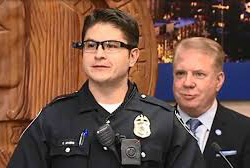Today the Seattle City Council voted to green-light a plan to eventually put body cameras on every cop in Seattle. The state chapter of the ACLU warns that without better policies governing them, the body cameras may fail at holding police accountable but succeed at surveilling the public.
Support for police body cameras has grown over the past couple years in tandem with public outrage over unaccountable police violence. That outrage, of course, is itself a consequence of the proliferation of camera phones, which allow observers to document some abuses by police. In short: camera phones led to outrage, which led to current plans to put body cams on police. Seattle has already rolled out a pilot version using bike cops.
Elected leaders have been quick to embrace body cameras as a technical, apolitical way of addressing police violence in today’s polarized political environment. As Seattle Mayor Ed Murray said in 2015, “We know that body cameras improve interactions between officers and the public and reduce the likelihood that force will be used. We will work carefully to get this right and adequately address privacy concerns.”
But Shankar Narayan, who works on technology and privacy for the Washington ACLU, says that’s not happening. In a letter to city council last week, he wrote, “While body cameras are being touted as an accountability tool, SPD’s policy emphasizes prosecution above accountability…SPD’s policy gives so much discretion to officers that any failure to record could be justified under it.” Narayan also warned about the dangers of widespread surveillance once panopti-cops become the norm. Thanks in part to our state’s strong public records laws, he said, “Police body cameras create a massive trove of publicly available location data that is available to the federal government.” Therefore, Narayan and the state ACLU urged the city council to put the body camera program on hold until the state legislature makes changes to public records laws to protect individuals’ privacy. That process could take years.
At their full council meeting this afternoon, the city council voted 6-2 in favor of proceeding with the body cams. Reliable lefties Kshama Sawant and Mike O’Brien voted no based on the concerns raised by Narayan and others, and Lisa Herbold was absent.
The rest of the council voted aye. “Body worn video is another step toward greater transparency and accountability of police in Seattle,” said Tim Burgess before the vote. He characterized the ACLU-WA’s concerns about the cameras being used for prosecution instead of accountability as, “We can use this camera against [the police officer wearing it] if [they] engage in misconduct, but we cannot use it against the person who assaulted [the officer].” Burgess called this position “crazy.”
“Video and audio recording is not new in the police department,” he said, noting that Seattle police cars have had dash cams since 2006.








